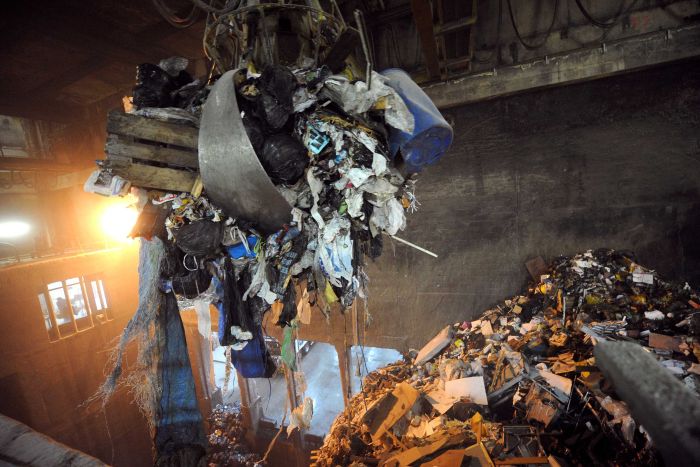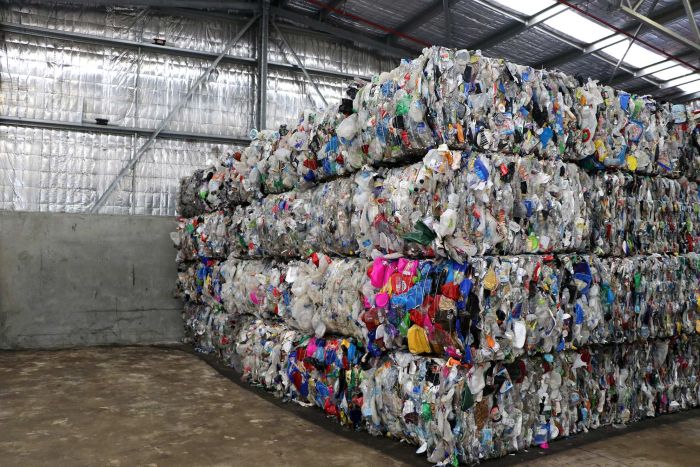Date: 1 May 2018

Burning waste means we are still reliant on virgin resources. (Getty Images/AFP: Jean-Francois Monier)
Waste-to-energy projects may be expanded to help tackle the growing recycling crisis in Australia, according to Minister for Energy and Environment Josh Frydenberg.
But industry has warned that burning waste to produce energy should be an absolute last resort, and instead say the Government needs to lead by example by preferencing recycled materials in its infrastructure projects.
Speaking to AM's Sabra Lane today, Mr Frydenberg described Australia's waste management problem as an "important, urgent issue" that he was looking forward to working with the states to solve.
"We've already got more than 30 [waste-to-energy] projects underway in Australia...and we look forward to expanding these over time," Mr Frydenberg said.
"In the United States, they have a significant number of these projects — there's a plant just outside Paris, there's one in London; this is a common form of waste-to-energy projects [sic] that we could roll out here in Australia."
Although waste-to-energy can take many forms, the most common is to feed garbage into sophisticated incineration systems that burn waste as a fuel to generate energy.

The Government is looking to examples like Germany, where waste is incinerated for energy. (Getty Images: Michael Utech)
A number of countries including Sweden, the United States and Germany already use the technology.
Sweden incinerates about 50 per cent of its waste, using the energy to power homes and to provide district heating.
Since 2014, the Swedes have been importing more than 2 million tonnes of waste per year from neighbouring countries to feed their incinerators and dumping next-to-nothing in landfill.
But if the technology detracts from a focus on reusing and recycling resources, then it is doing us a disservice, accrording to Gayle Sloan from the Waste Management Association of Australia (WMAA).
"We as an industry, we know that waste-to-energy has a role to play. But it's one of the lowest options on the hierarchy, as in it's the last resort before landfill," she said.
"Once you've burnt it, it's gone. You don't get that resource back."
Strict regulation needed to allay 'serious' pollution concern
Plastic, for instance, is primarily made from virgin fossil fuel.
About 4 per cent of global oil production goes into plastics, and that's expected to rise to about 20 per cent by 2050.
Burning plastics for fuel squanders a valuable resource, according to Rachael Wakefield-Rann from the Institute of Sustainable Energy Futures at the University of Technology, Sydney.
"This would be really problematic because it would increase our demand for virgin products like oil," she said.
"Research is pretty clear that incineration is much less beneficial than recycling in terms of getting that circular flow of resources back into the economy."
Although countries like Switzerland strictly monitor and limit the emissions from their incinerators, Ms Wakefield-Rann said she had concerns over whether Australia would do the same.
"There's still very serious concerns about the pollution that would come from an incinerator of the scale that's required," she said.
"There's not really any demonstration that we have the regulation to ensure that the emissions on our incinerators would be captured."
Government needs to 'show leadership' on procurement

Experts say the Government needs to have mandatory recycling quotas in projects. (ABC News: Jessica Strutt)
Australia currently has vast amounts of recycling, including glass sitting in stockpiles around the country.
Although it's one thing to recycle materials, it's essentially pointless if those materials aren't purchased and reused.
As part of its $150 million plan to get recycling back on track in Australia, the Australian Council of Recycling (ACOR) has recommended the Government invest $20 million to ensure the preferencing of recycled materials in its infrastructure projects.
Ms Wakefield-Rann said this needs to be a central theme of any future recycling plan.
"Because of the scale of Government projects they're often the biggest procurer of resources," she said.
"Changing Government procurement policies to ensure that a certain percentage of their materials have to come from recycled sources would change the situation right away."
Ms Sloan also said the Government needs to step up.
"The Government needs to show leadership in this space. At all levels, they should be buying recycled materials and showing the value of it," she said.
"We've already got the ability to recycle, we just don't have the demand."
By environment reporter Nick Kilvert
Source: ABC News
